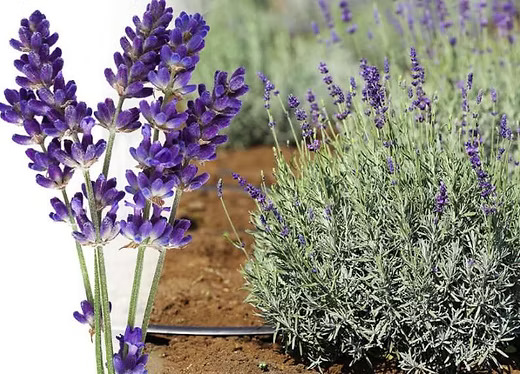Lavender – The Scent That Calms the Soul

Lavender is more than just a fragrant flower — it is a symbol of peace, purity, and emotional balance. Its soft purple tones and gentle aroma have inspired people for centuries, becoming one of nature’s most cherished remedies for both body and soul. In folk medicine, lavender was used to relieve stress, promote sleep, and soothe pain long before science proved its healing powers. Today, it remains a bridge between ancient wisdom and modern wellness.
Origins and History
Lavender (Lavandula angustifolia) originates from the sunny, dry regions of the Mediterranean. Its name comes from the Latin word lavare, meaning “to wash,” reflecting its ancient use in baths and cleansing rituals. The Romans added lavender to their bathing water to purify the body and refresh the mind, believing its aroma brought clarity and renewal.
During the Middle Ages, monks planted lavender in monastery gardens to protect against evil spirits and plague. People also used it to perfume clothes and linens, believing that its scent purified the home and brought calm energy. In many cultures, lavender was considered a sacred herb — a natural guardian of peace.
Healing Components and Medicinal Power
Lavender flowers contain essential oils rich in linalool, linalyl acetate, coumarins, and tannins. These compounds give the plant its anti-inflammatory, antiseptic, and relaxing properties.
Key Benefits:
Calming and anti-stress: The scent of lavender reduces anxiety, nervous tension, and emotional fatigue.
Sleep aid: Lavender stimulates serotonin production in the brain and promotes deep, restorative sleep.
Circulation booster: Its oil improves blood flow and helps relax tense muscles.
Antibacterial and healing: Useful for minor burns, wounds, and skin irritation.
Respiratory support: Steam inhalation with lavender relieves sore throats, colds, and sinus congestion.
Ways to Use Lavender
🌿 1. Aromatherapy
Lavender essential oil is one of the most popular oils in aromatherapy. Just a few drops in a diffuser, or on a pillow, can calm the nervous system and create a peaceful atmosphere.
Scientific studies show that inhaling lavender reduces heart rate and blood pressure, helping the body enter a natural state of relaxation without medication.
☕ 2. Lavender Tea
A warm cup of lavender tea is both soothing and healing. It relieves stress, aids digestion, and helps prepare the body for sleep.
To make it, steep one teaspoon of dried lavender flowers in boiling water for 10 minutes. Drink it slowly in the evening — it’s like a soft lullaby from nature.
💧 3. Lavender Oil for Skin
Diluted lavender essential oil works as a natural antiseptic for burns, insect bites, acne, and small wounds. It reduces inflammation, speeds up healing, and soothes irritated skin.
Never apply pure essential oil directly — always mix it with a carrier oil such as olive, almond, or coconut oil.
🛁 4. Relaxing Bath
Adding a handful of lavender flowers or a few drops of essential oil to warm bathwater transforms an ordinary bath into therapy.
It relieves fatigue, loosens tight muscles, and prepares both body and mind for a peaceful night’s rest.
🕯️ 5. Scented Pillows and Candles
In folk tradition, lavender-filled sachets or small pillows were placed under children’s beds to ward off nightmares and bring calm sleep.
Today, that tradition lives on through lavender candles, essential oil diffusers, and home sprays that fill rooms with harmony and gentle serenity.
Lavender for Emotional Healing
Lavender doesn’t just heal the body — it also soothes the soul. Its fragrance reduces emotional tension, helps with anxiety, and lifts the mood during sadness or exhaustion.
In therapy settings, lavender oil is often used to create a safe, relaxing environment. Psychologists say it helps people open up emotionally and feel grounded.
In folklore, lavender was known as the “sun herb” — a plant that turns darkness into light. Its aroma was said to chase away sadness and bring peace to the heart.
Safety and Recommendations
While lavender is gentle, it should still be used thoughtfully:
Do not apply undiluted essential oil directly on the skin. Always mix with a carrier oil.
Pregnant women (especially in the first trimester) and small children should use it only under professional advice.
Drinking too much lavender tea may cause drowsiness or low blood pressure — 1–2 cups per day is enough.
Lavender in Modern Medicine
Scientific studies confirm what traditional healers have known for centuries. Inhaling lavender aroma can reduce anxiety levels by up to 30%, while massages with lavender oil improve sleep quality and stabilize heart rate.
Today, many hospitals and clinics use lavender aromatherapy to help patients relax before surgery or medical treatments.
Lavender is also a staple in natural cosmetics and perfumery — found in creams, shampoos, lotions, and calming sprays. Its scent represents purity, balance, and wellness.
Conclusion
Lavender is the essence of natural tranquility. Its violet blossoms and soft fragrance bring the mind, body, and spirit back into harmony. Folk medicine has always considered it a gentle yet powerful healer — and even in the modern world, lavender remains the elixir of calm.
When the day feels heavy or your thoughts restless, simply breathe in its soothing scent or sip a cup of lavender tea.
It’s nature’s quiet way of saying: “Rest now — everything will be all right.” 💜












